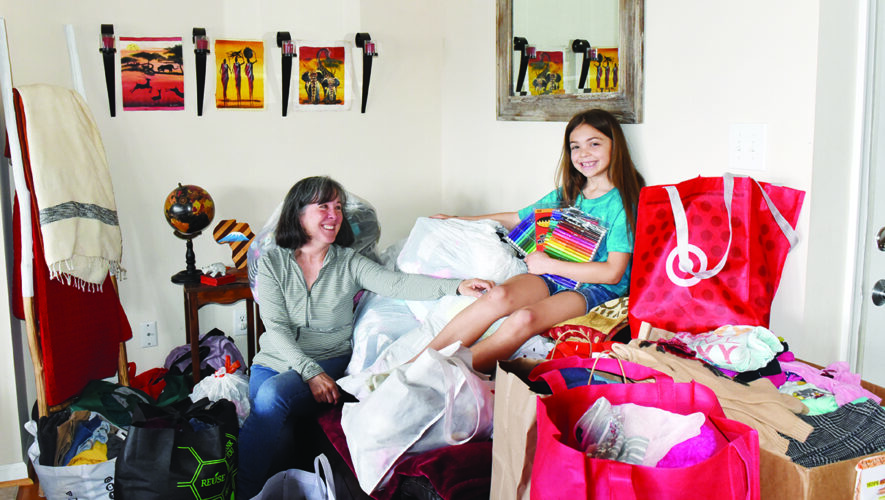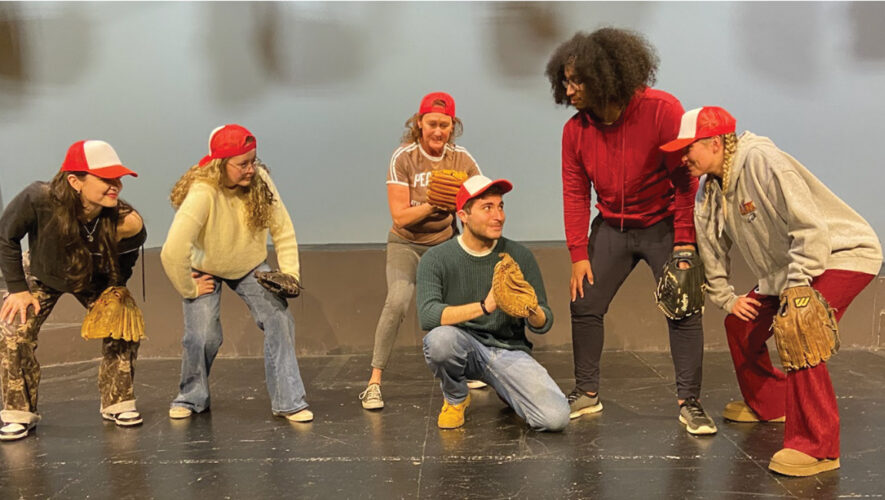OCEAN CITY — Third-grader Harper Juelg wasn’t content to sit back after starting a clothes drive for her grandmother’s nonprofit organization in Tanzania.
The Ocean City Primary School student got on the public address system and went around the school to get her peers to donate clothes to children in need halfway around the world.
When the little Ocean City resident wanted to do the drive, Primary School Principal Dr. Cathleen Smith sat down with Harper and came up with a game plan and then Harper provided details to her fellow students to get them on board.
“She was very gung-ho and she was checking all the bins and baskets. When (donations) weren’t coming in she went through the school rallying, getting her friends to get the bins filled,” Smith said. “She did a great job. And as her grandmom said, we had record amounts of items for her to bring. She was a real go-getter.”
“We collected clothes for ages 4 through 12 for Tanzania,” Harper said. “We collected lots of clothes, lots of shirts, lots of pants and some school supplies.”
The drive was March 20-31 at the Primary School. Her grandmother, Diana Juelg, a pediatric nurse practitioner who is certified as a specialist in pediatric mental health, took some of those supplies with her to Tanzania in mid-April.
“I’m very happy they did it,” Harper said, talking about her classmates and teachers who supported the drive. Although the diminutive 9-year-old wasn’t able to carry the many bags upstairs to her grandmother’s house-turned-staging-area on West Avenue, she did her part in moving them. “I helped put them on the little rolly thing,” she said.
“I could not be more proud of her,” Diana Juelg said, adding that the principal told her initially there weren’t a lot of donations. “There were little things trickling in, then Harper got on the PA every morning to rally everybody and Dr. Smith told me the story of how things started flowing in.
“(Harper) got everybody behind her and seeing the importance of how fortunate we are here,” Juelg said. “My hope and dream is to give my grandchildren — I’m tearing up a little bit — a global perspective so they grow up with a sense of gratitude.”
That is something Smith sees in Harper and what she believes is important to instill in children her age.
Smith said she was impressed with the third-grade students talking to Harper in the hallways about what they were bringing in and the talk about supporting each other.
“This is what you want to do, to be able to pay it forward,” Smith said. “This is where it starts — for a third-grade student to have that in her so that she brings it with her in life and for students of that age level to be able to help. They carry that through their life.”
“It’s a great family,” she said of the Juelgs, “and a great way to start. We always try to do as much as we can, to pay it forward in all kinds of ways. To have it student-led at this age group is amazing. And to have someone of this tenacity to lead it … as you know, tenacity is a great word for (Harper).
“She is a dynamic beauty with a soul that is one of a kind,” Smith said. “I enjoyed every minute with her. It was the highlight of my day.”
The principal also has praise for Ocean City.
“We are in a community that supports everyone,” Smith said. “The staff and the students definitely rallied around her. I think it’s a given for where we are. We are totally in a community that supports each other. … It was great to see (her friends) bringing in whether it was one or two items or a bag of clothing, and parents, community members just bringing in bags to support the cause.”
Her grandmother’s NGO: Hope for a Better Future
Diana Juelg’s nonprofit NGO (nongovernmental organization) works in two communities in Tanzania in the foothills of Mount Kilimanjaro. It is called Hope for a Better Future (hope4abetterfuture.com).
Juelg, the executive director, started her organization in 2015 after spending a few years taking trips to Kenya. In 2011 she was invited to work with a couple who had a non-profit children’s center. She would take trips there through 2014 to help from a pediatric perspective, providing nursing guidance and helping set up protocols, but that stopped in 2015 when Kenya put a halt to International NGOs in the country.
In January 2015, she took part in a volunteer tourism opportunity in Tanzania. What she found was compelling, seeing women do the work in an abusive, male-dominated society.
“There was something about that trip,” she said.
She worked with a woman from Sweden who was helping with education while she provided medical support. They bonded and united with a retired pediatric surgeon, “Dr. Steve.”
“We started a discussion about helping the women there and one thing led to another,” Juelg said. “I had this feeling that I needed to do more and my kids were all grown.”
Dr. Steve was instrumental in helping write the constitution for an NGO and there was a lawyer in the U.S. who could help with a non-profit, 501C-3, but they weren’t optimistic. After 9/11, the IRS was cautious about international non-profits, Juelg explained.
They applied in March 2015 for the NGO and were surprised that they were approved in June of that year, much faster than they expected.
“The lawyer was like, ‘that’s unheard of.’ There were more signs this was what we were supposed to do,” she said.
As she and Dr. Steve worked with the government in Tanzania to form the NGO, they were told they needed three people. She emailed her Swedish friend, Nellie, who responded, “Yes. I don’t know what I’m saying yes to, but yes.”
“And so since 2015 Nellie and I, except for that span during the pandemic, go two or three times a year to Tanzania,” Juelg said. They have helped 80 women start their own small business in a community called Marangu. They started a preschool in Mikameli village for children and got a donor to fund it. They give the children porridge in the mornings, supply uniforms, have teachers and a matron, akin to a nurse’s aid, who watches over the children.
Another project is a well that is supplying fresh drinking water for more than 3,000 residents.
The clothes from the fund drive are planned for the women in Marangu and for the children in Mikameli. Tanzania has been hit hard in recent years, Juelg said, first because of the COVID-19 pandemic and then because of the war in Ukraine, which has limited supplies of gas and food.
Juelg said because of the nature of the area, she can’t ship items because there is no guarantee they’ll arrive. She takes 100 pounds of clothing and school supplies with her at a time — 50 pounds for each piece of luggage she is allowed. What she needs for herself she puts in her backpack. Given the large amount of items Harper solicited during the drive, Juelg said there is enough for her to take for the next two years or so.
The second drive
Harper’s older brother, Gunner, oversaw an earlier clothing drive at the Primary School, prompting his little sister to question her grandmother.
“Who got more stuff, me or Gunner?”
Laughing, Diana said, “I don’t know.” When she was searching for a “beautiful picture” of Gunner showing him with all the clothes his drive netted, that prompted yet another question.
“Beautifuler than me?” Harper asked. “Well, he’s handsome,” her grandmother replied.
Juelg told her she would have a pizza party for Harper’s class to thank them for their support.
“Can you bring doughnuts?” Harper asked.
Smiling lovingly at her granddaughter, Juelg responded, “I can bring whatever you want.”
Learn more about Juelg’s organization at hope4abetterfuture.com.



